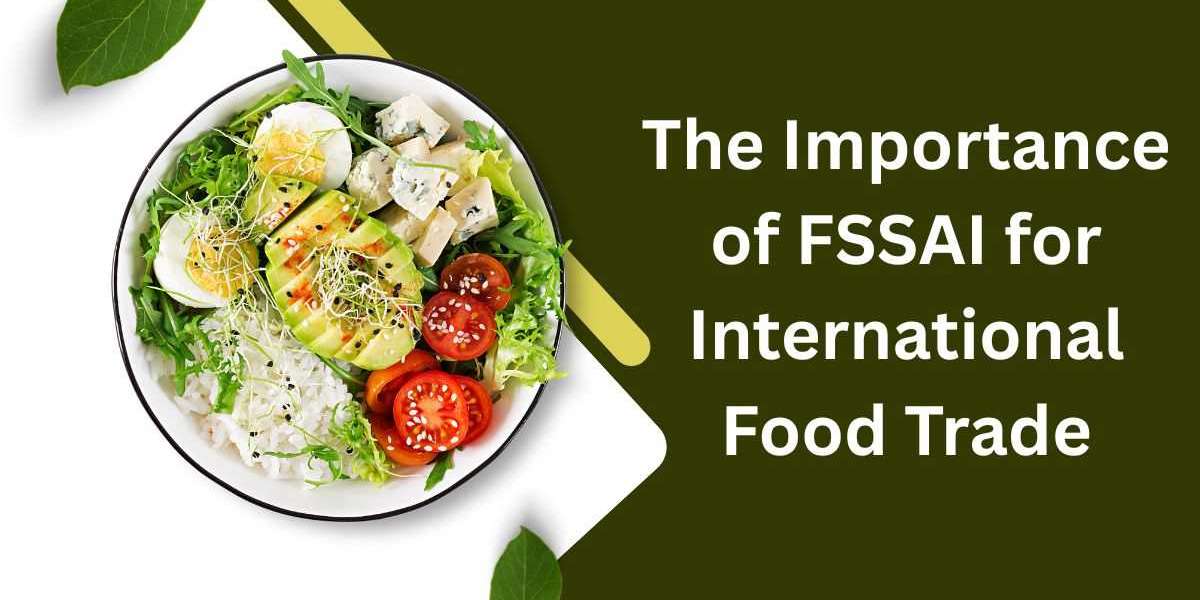In today’s globalized world, food trade is one of the most significant industries, connecting producers and consumers across different countries. However, ensuring food safety and quality remains a major challenge. To address this, regulatory bodies like the Food Safety and Standards Authority of India (FSSAI) play a crucial role in maintaining safety standards, especially for businesses involved in international food trade.
For Indian food exporters and importers, the FSSAI Certificate is essential to ensure compliance with global standards, build consumer trust, and expand business opportunities. This article explores the importance of FSSAI in international food trade, its role in exports and imports, and how it benefits food businesses.
What is FSSAI?
The Food Safety and Standards Authority of India (FSSAI) is an autonomous body established under the Food Safety and Standards Act, of 2006. It is responsible for setting food safety regulations and ensuring that all food products meet the required quality and safety standards in India.
FSSAI works under the Ministry of Health and Family Welfare, Government of India, and ensures that food businesses follow hygiene, labeling, and safety regulations. Its certification is mandatory for food manufacturers, importers, exporters, and traders operating in India.
Why is FSSAI Important for International Food Trade?
International food trade involves stringent regulations to ensure that food products meet the health and safety standards of different countries. FSSAI plays a vital role in this by:
Ensuring Compliance with International Standards
FSSAI regulations align with global food safety standards, such as the Codex Alimentarius (CODEX), HACCP, and ISO 22000. This ensures that Indian food products meet the requirements of foreign markets, making it easier for exporters to sell their products internationally.
Enhancing Food Safety and Quality
FSSAI mandates strict testing, labeling, and hygiene standards, ensuring that food products are free from contamination, adulteration, and harmful substances. This enhances the credibility of Indian food businesses in international markets.
Boosting Consumer Confidence
International buyers prefer food products that adhere to globally accepted safety standards. FSSAI certification serves as proof that the food is safe, hygienic, and of high quality, increasing consumer trust in Indian food exports.
Simplifying Import and Export Procedures
Countries have strict import regulations, and FSSAI ensures that Indian food businesses comply with them. An FSSAI license is often required for exporting packaged foods, dairy, meat, seafood, and processed products, simplifying international trade approvals.
Reducing Trade Barriers and Rejections
Without proper certification, food exports can face rejections, delays, and additional testing in foreign countries. FSSAI compliance minimizes such risks by ensuring that food products meet global safety requirements before export.
Role of FSSAI in Food Exports
Exporting food from India requires compliance with both domestic and international regulations. FSSAI plays a key role in this process by:
Issuing FSSAI Export Certification
Food exporters must obtain an FSSAI Export License to ship products overseas. This certification ensures that products meet hygiene, safety, and labeling standards required by importing countries.
Approving and Monitoring Export Units
FSSAI inspects and certifies food processing units, warehouses, and manufacturing facilities to ensure they follow safety guidelines. This enhances the credibility of Indian food exports in global markets.
Regulating Food Packaging and Labeling
International markets require strict labeling norms, such as mentioning:
✔ Ingredients and allergens
✔ Manufacturing expiry dates
✔ Nutritional values
✔ Country of origin
✔ Storage conditions
FSSAI ensures that Indian exporters comply with these requirements, reducing the chances of customs rejection.
Promoting Indian Food Exports
FSSAI works with trade organizations like the Agricultural and Processed Food Products Export Development Authority (APEDA) to promote Indian food products globally. This boosts India's reputation as a reliable food exporter.
How to Get FSSAI Certification for International Trade?
Food businesses involved in import or export must obtain the relevant FSSAI certification. The process includes:
- Visit the Website: Go to the official FSSAI registration portal.
- Fill out the Form: Enter details like name, business info, food category, and address. Upload your PAN card.
- Review and Submit: Check the info and submit the form.
- Pay Fees: Make the payment online via card, net banking, or UPI.
- Verification: After payment, an FSSAI executive will contact you to verify an OTP sent to your registered mobile/email for further processing.
- Inspection: If required, FSSAI officials will inspect your setup. Once everything checks out, your license will be approved quickly!
- Receive License: Once approved, download your FSSAI license from the website.
Benefits of FSSAI for Food Businesses in International Trade
FSSAI certification provides several advantages for food businesses engaged in global trade:
- Legal Compliance – Ensures businesses operate legally in both domestic and international markets.
- Increased Market Access – Opens opportunities for food exports to high-demand markets like the US, EU, UK, UAE, and Southeast Asia.
- Higher Credibility – Enhances brand reputation by proving adherence to safety standards.
- Better Business Growth – Attracts more international buyers and partners.
- Protection from Penalties – Avoids fines, product recalls, and legal action due to non-compliance.
Also Read: FSSAI license renewal in India - Step by step guide
Conclusion
FSSAI plays a vital role in international food trade by ensuring that Indian food products meet global safety and quality standards. Whether you are a food exporter, importer, manufacturer, or trader, obtaining FSSAI certification is essential for smooth business operations, increased consumer trust, and expanded global market reach.








